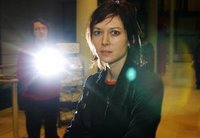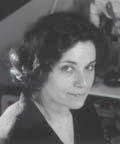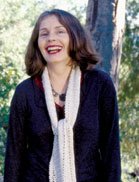 March is National Women’s History Month and time for the second annual “Animated Women” film festival at Baltimore's Enoch Pratt Library on Saturday, March 11, 2006 from 2:30-4:30 p.m. in Wheeler Auditorium. This is a film program I put together to showcase some of the best animated films created by the masters of the genre - people like Martha Colburn, Sally Cruikshank, Caroline Leaf, Louise Johnson, Kathy Rose, Michele Cournoyer, Janet Perlman, Suzan Pitt and others. All of the films shown at this free screening are available for loan from Pratt’s Sights & Sounds Dept. (410-396-4616). Below is the complete program guide and bios.
March is National Women’s History Month and time for the second annual “Animated Women” film festival at Baltimore's Enoch Pratt Library on Saturday, March 11, 2006 from 2:30-4:30 p.m. in Wheeler Auditorium. This is a film program I put together to showcase some of the best animated films created by the masters of the genre - people like Martha Colburn, Sally Cruikshank, Caroline Leaf, Louise Johnson, Kathy Rose, Michele Cournoyer, Janet Perlman, Suzan Pitt and others. All of the films shown at this free screening are available for loan from Pratt’s Sights & Sounds Dept. (410-396-4616). Below is the complete program guide and bios.*** PROGRAM GUIDE & FILMMAKER BIOS ***
MARTHA COLBURN
 As a self-taught filmmaker, former Baltimorean Martha Colburn has completed over 50 films since 1994 in the US and Europe and was featured in the New York Museum of Modern Art/San Francisco Cinematheque's “Big As Life” 8mm retrospective. Her work has appeared in numerous festivals including The Sundance Film Festival and The Rotterdam International Film Festival. Her work is largely hand-colored, found-footage collage animation and features musical and spoken-word scores by The Dramatics, The Jaunties, Jad Fair, Jason Willett, 99 Hooker and others. Lately she has been exploring “paint-on-glass” animation, a labor-intensive process that involves doing thousands of paintings under the camera on a piece of glass and filming each image frame-by-frame. After living in Amsterdam for several years as a participant artist at the Rijksakademie, Martha recently returned to the States to work in New York City. She is currently showing her films on a multi-city tour with the indie rock band Deer Hoof, for whom she directed a music video (see it on www.killockstars.com). Pratt owns Colburn’s official film shorts collection The Films of Martha Colburn, 1995-1999, which is distributed by the Women Make Movies organization.
As a self-taught filmmaker, former Baltimorean Martha Colburn has completed over 50 films since 1994 in the US and Europe and was featured in the New York Museum of Modern Art/San Francisco Cinematheque's “Big As Life” 8mm retrospective. Her work has appeared in numerous festivals including The Sundance Film Festival and The Rotterdam International Film Festival. Her work is largely hand-colored, found-footage collage animation and features musical and spoken-word scores by The Dramatics, The Jaunties, Jad Fair, Jason Willett, 99 Hooker and others. Lately she has been exploring “paint-on-glass” animation, a labor-intensive process that involves doing thousands of paintings under the camera on a piece of glass and filming each image frame-by-frame. After living in Amsterdam for several years as a participant artist at the Rijksakademie, Martha recently returned to the States to work in New York City. She is currently showing her films on a multi-city tour with the indie rock band Deer Hoof, for whom she directed a music video (see it on www.killockstars.com). Pratt owns Colburn’s official film shorts collection The Films of Martha Colburn, 1995-1999, which is distributed by the Women Make Movies organization.Web site: www.marthacolburn.com
Evils of Dracula (1997)The media is a vampire sinking its fangs into the lifeblood of drained consumers everywhere. At least that what we think Martha’s getting at here! The soundtrack is by Jad Fair (of 1/2 Japanese fame) and local noise maestro Jason Willett. (1997, 2:36 minutes, video)
There's a Pervert in my Pool (1998)
Rather self-explanatory, with celebrity guest cutouts of pool pervs Peter Sellers, Woody Allen and Michael Jackson cavorting to the madcap words of Motor Moron Fred Collins and the zany sounds of Martha Colburn and Jason Willets. (1998, 3:40 minutes, video)
What's On (1997)So many channels, so little content. More medium saturation with free-form oration/commentary by 99 Hooker.
(1997, 1:32 minutes, video)
JOANNA PRIESTLEY
 Joanna Priestley has produced and directed 16 award-winning films through her company, Priestley Motion Pictures. Priestley attributes her interest in animation to a toy zoetrope that she had as a child, to the rain in Oregon and to a grandmother that did china painting. Priestley has teaches animation at the Art Institute of Portland and presents programs of her work and animation workshops worldwide. Her films are distributed by the Museum of Modern Art (212-708-9532) and Canyon Cinema (415-626-2255).
Joanna Priestley has produced and directed 16 award-winning films through her company, Priestley Motion Pictures. Priestley attributes her interest in animation to a toy zoetrope that she had as a child, to the rain in Oregon and to a grandmother that did china painting. Priestley has teaches animation at the Art Institute of Portland and presents programs of her work and animation workshops worldwide. Her films are distributed by the Museum of Modern Art (212-708-9532) and Canyon Cinema (415-626-2255).Website: http://users.easystreet.com/joanna/
Voices (1985)
In this award-winning short (available for loan on Pratt’s copy of the New Shorts On Video 2: Award-Winning American Animation 1980-1985 collection), Priestley uses a drawing-on-paper animation technique to humorously explore people’s shared phobias: of darkness, monsters, aging, being overweight and global destruction. Sound by R. Dennis Wiancko. Voice by Joanna Priestley. (Joanna Priestley, 1985, 4 minutes, color, video)
PEG MCCLURE
Not much is known about Peg McClure other than she’s a Seattle, WA-based freelance illustrator and graphic designer who likes cats. This humorous short looks at how two cats co-exist while getting into non-stop trouble; Nickelodeon liked it enough to feature it on their cable TV channel.
Housecats (1984)
Our version of Housecats is taken from New Shorts On Video 2: Award-Winning American Animation 1980-1985, a video compilation tape available in Pratt’s Sights & Sounds Dept. (Peg McClure, 1985, 5 minutes, color, video)
VALERIE SWANSON
We were unable to find out any information about this artist, other than what our eyes tell us: she’s obviously very talented! Oh, and it looks like she did some rotoscoping work on 1987’s Superman IV: The Quest For Peace.
Charlie’s Boogie-Woogie (1985)
This is another film taken from the New Shorts On Video 2: Award-Winning American Animation 1980-1985 video compilation tape. (Valerie Swanson, 1985, 4 minutes, color, video)
WENDY TILBY & AMANDA FORBIS
 Wendy Tilby was nominated for an Academy Award in 1991 for Strings, a National Film Board animated short. Her other credits include the independent short Tables of Content. Tilby uses a laborious process of stop-motion animation and painting on glass to create the look of her films. Amanda Forbis directed the NFB animated film The Reluctant Deckhand (1995) and contributed animation work on Seven Crows a Secret (1994). Currently living in Montreal, the animation duo met in 1985 while students at the Emily Carr Institute of Art and Design in Vancouver.
Wendy Tilby was nominated for an Academy Award in 1991 for Strings, a National Film Board animated short. Her other credits include the independent short Tables of Content. Tilby uses a laborious process of stop-motion animation and painting on glass to create the look of her films. Amanda Forbis directed the NFB animated film The Reluctant Deckhand (1995) and contributed animation work on Seven Crows a Secret (1994). Currently living in Montreal, the animation duo met in 1985 while students at the Emily Carr Institute of Art and Design in Vancouver. When the Day Breaks (1999)When the Day Breaks is the charming, bittersweet story of Ruby, the pig, whose life takes an unexpected turn after she witnesses the accidental death of a stranger. With deft humor and finely rendered detail, the film illuminates the links which connect our urban lives, while evoking the promise and fragility of a new day. The film, described as "a four-year labor of love" by the filmmakers, is exquisitely crafted, using pencil and paint on photocopies to create a textured look reminiscent of lithographs or flickering newsreels. (Wendy Tilby and Amanda Forbis, 1999, 10 minutes, color, video)
CAROLINE LEAF
 Caroline Leaf's animated films are renowned for their emotional content and graphic style, closely tied to the innovative animation techniques that she has invented. Her storytelling films flow fluidly with a handcrafted sensibility. They are made by manipulating beach sand on a light box or finger painting on glass under the camera lens, and scratching directly into film emulsion. Leaf is a master of this “under camera” animation technique in which, as Leaf has observed, “One films as one draws, and one image is destroyed to create the next image. When a sequence has been filmed, there is nothing left except the film.” Leaf has won numerous honors over the years, including a Life Achievement Award in 1996 from the Zagreb International Animation Festival. She currently resides in London, where she works for Acme Filmworks, and also is a part-time animation instructor at Konstatfack in Eksjo, Sweden.
Caroline Leaf's animated films are renowned for their emotional content and graphic style, closely tied to the innovative animation techniques that she has invented. Her storytelling films flow fluidly with a handcrafted sensibility. They are made by manipulating beach sand on a light box or finger painting on glass under the camera lens, and scratching directly into film emulsion. Leaf is a master of this “under camera” animation technique in which, as Leaf has observed, “One films as one draws, and one image is destroyed to create the next image. When a sequence has been filmed, there is nothing left except the film.” Leaf has won numerous honors over the years, including a Life Achievement Award in 1996 from the Zagreb International Animation Festival. She currently resides in London, where she works for Acme Filmworks, and also is a part-time animation instructor at Konstatfack in Eksjo, Sweden. Web site: www.awn.com/leaf/
For a good overview of her career, also see the National Film Board of Canada’s Web site: http://www.nfb.ca/e/highlights/caroline_leaf.html
The Street (1976)Note: If you like The Street, Pratt also owns two other Leaf short films: 1986’s Two Sisters (Entre Deux Sœurs) and 1977’s Metamorphosis of Mr. Samsa, which are included on the video Tales from the Dark Side.This Oscar-nominated film tells of a family's summer-long deathbed vigil in the Jewish section of Montreal. Based on a short story by Mordecai Richler, it conveys the frustrations, resentment, worry and selfishness a young boy and his family experience as they await the death of the ailing grandmother. Leaf used paint mixed with glycerine to lend her images the effect of moving sand. (1976, 10 minutes, color, video)
JANET PERLMAN
 Janet Perlman was born in Montreal, Quebec, and studied graphic design and film production at the School of Art and Design of the Montreal Museum of Fine Arts. She joined the Animation Studio of the National Film Board of Canada (NFB) in 1973. For the next ten years she wrote and directed theatrical shorts, educational films, films for children, and television spots. Pratt owns several Perlman films from this period - including Lady Fishbourne's Complete Guide to Better Table Manners and The Tender Tale of Cinderella Penguin (we screened both of these shorts at last year’s “Animated Women” film program) – as well as the more recent Dinner for Two and Bully Dance.
Janet Perlman was born in Montreal, Quebec, and studied graphic design and film production at the School of Art and Design of the Montreal Museum of Fine Arts. She joined the Animation Studio of the National Film Board of Canada (NFB) in 1973. For the next ten years she wrote and directed theatrical shorts, educational films, films for children, and television spots. Pratt owns several Perlman films from this period - including Lady Fishbourne's Complete Guide to Better Table Manners and The Tender Tale of Cinderella Penguin (we screened both of these shorts at last year’s “Animated Women” film program) – as well as the more recent Dinner for Two and Bully Dance.Dinner For Two (1997)LOUISE JOHNSONThis film was part of the NFB’s “ShowPeace” series of animated films without words, designed as flexible tools to explore conflict resolution. The story describes how peace in the rain forest is disrupted when two chameleons get stuck in a conflict, with catastrophic results. As they battle over territory, these two small animals realize that their conflict affects not just them, but their whole environment. Luckily, a frog observing the fracas turns into exactly what they need - a mediator. Awards: 1997 San Diego Film Festival best animation award; Animated Eye Award at the Aspen Shorts Festival; Bronze Apple at the National Educational Media Competition and the Best Short Film at the Montreal World Film Festival. (Janet Perlman, 1997, 8 minutes, color, video)
 Another Canadian female animator, Louise Johnson received a bachelor's degree in Fine Arts in drawing and painting from the University of Calgary and graduated with distinction from the Concordia University Film Animation program. According to her National Film Board of Canada (NFB) bio, Johnson’s student films garnered numerous awards, including Concordia University's Norman McLaren Award for Outstanding Achievement in Animation in 1989. After teaching animation to children for several years, she received a Canada Council film production grant, worked freelance in the animation industry and served on the ASIFA (Association international du film d'animation) Canada Board, as vice-president and editor of the ASIFA Bulletin. Her most recent film for NFB, A Monster’s Calling, is about personal anxieties and body image.
Another Canadian female animator, Louise Johnson received a bachelor's degree in Fine Arts in drawing and painting from the University of Calgary and graduated with distinction from the Concordia University Film Animation program. According to her National Film Board of Canada (NFB) bio, Johnson’s student films garnered numerous awards, including Concordia University's Norman McLaren Award for Outstanding Achievement in Animation in 1989. After teaching animation to children for several years, she received a Canada Council film production grant, worked freelance in the animation industry and served on the ASIFA (Association international du film d'animation) Canada Board, as vice-president and editor of the ASIFA Bulletin. Her most recent film for NFB, A Monster’s Calling, is about personal anxieties and body image.When the Dust Settles (1997)Like Janet Perlman’s Dinner For Two, When the Dust Settles was produced for the NFB’s “ShowPeace” conflict resolution series. This award-winning film, which was screened at over 50 international festivals, addresses how two gophers resolve their territorial dispute. This seven-minute short was done entirely “under-camera” using dust, graphite, colored pencils and an electric eraser. (Louise Johnson, 1997, 7 minutes, color, video)
LYNN SMITH
 Lynn Smith started life as an independent animation filmmaker in Cambridge, Massachusetts in 1968 and moved to Montreal in 1975 to work at the National Film Board of Canada, where she specialized in children's filmmaking. Her past credits include the award-winning children’s classics The Shout It Out Alphabet Film, Teacher, Lester Bit Me! and This Is Your Museum Speaking. She currently teaches animation at Concordia University in Montreal.
Lynn Smith started life as an independent animation filmmaker in Cambridge, Massachusetts in 1968 and moved to Montreal in 1975 to work at the National Film Board of Canada, where she specialized in children's filmmaking. Her past credits include the award-winning children’s classics The Shout It Out Alphabet Film, Teacher, Lester Bit Me! and This Is Your Museum Speaking. She currently teaches animation at Concordia University in Montreal.Pearl’s Diner (1993)MICHELE COURNOYERThe idea for the film was originally suggested by a chance meeting with a waitress friend of the animator, who mentioned that she thought two people were using her restaurant as a romantic rendezvous. Her curiosity piqued, Smith applied her labor-intensive animation technique, which involves using thousands of paper cutouts – to produce one of her few works for and about adults. Smith prefers to animate “directly under the camera” with pastels, cut-outs, paints, or crayons. Pearl's Diner received numerous international awards, including the 1993 Genie Award for Best Animated Short from the Academy of Canadian Cinema and Television. (Lynn Smith, 1993, color, 8 minutes, video)
 Quebec native Michele Cournoyer is a hard-luck painter and independent animator who made her first film while studying graphic design in 60s London. In a July 2001 interview with Take One writer Chris Robinson Cournoyer recalled, "I went to 'swinging' London in the 1960s with a $90 plane ticket and a government grant of $2,000. I was printing pillows on pillows, pearls on pillows, hands on gloves. There my images started to move with music, and then film came to me one day." From that point there was no looking back for Cournoyer, whose battles with personal and family illness (she put her art studies on hold for three years to care for her mother, who died when she was 20) have cast a dark shadow over her films, which often deal with emotional or sexual abuse. In fact, Chris Robinson has commented that Cournoyer's films take viewers, “to places we do not want to see, to a darkness that lurks behind our scared small-talk smiles. In this darkness we stumble.”
Quebec native Michele Cournoyer is a hard-luck painter and independent animator who made her first film while studying graphic design in 60s London. In a July 2001 interview with Take One writer Chris Robinson Cournoyer recalled, "I went to 'swinging' London in the 1960s with a $90 plane ticket and a government grant of $2,000. I was printing pillows on pillows, pearls on pillows, hands on gloves. There my images started to move with music, and then film came to me one day." From that point there was no looking back for Cournoyer, whose battles with personal and family illness (she put her art studies on hold for three years to care for her mother, who died when she was 20) have cast a dark shadow over her films, which often deal with emotional or sexual abuse. In fact, Chris Robinson has commented that Cournoyer's films take viewers, “to places we do not want to see, to a darkness that lurks behind our scared small-talk smiles. In this darkness we stumble.”La Basse Cour (A Feather Tale) (1992)
This film about abusive relationships is considered Michele Cournoyer’s strongest film after Le Chapeau (The Hat), which dealt with sexual abuse, and landed her a job with the National Film Board of Canada. As Take One’s Chris Robinson describes the film:It opens with the shot of a cracking egg forming a face with tears. Something has been broken. A sleeping woman receives a call from her lover. He wants her to come over. She obeys and arrives in a take-out delivery box as a chicken. The man holds her, rocks her, pulls her feathers off and begins to eat her. Initially, the woman allows herself to play this role, but she realizes she must take control of the situation before she completely loses herself. The final shot of the film shows the woman waking up, the man snoring beside her, and feathers on the ground. The addiction is over.
(Michele Cournoyer, 1992, 5 ½ minutes, color, video)
SALLY CRUIKSHANK
 Sally Cruikshank’s animated films have long been favorites of the indie and animated film festival circuit. Besides her independent film shorts, Cruikshank also did animation sequences for the mainstream comedy features Mannequin (1987) and Ruthless People (1986). Cruikshank’s films are now available on DVD through her Web site, including Quasi at the Quackadero, Make Me Psychic, Quasi’s Cabaret, Face Like a Frog, Chow Fun, Fun On Mars and Ducky.
Sally Cruikshank’s animated films have long been favorites of the indie and animated film festival circuit. Besides her independent film shorts, Cruikshank also did animation sequences for the mainstream comedy features Mannequin (1987) and Ruthless People (1986). Cruikshank’s films are now available on DVD through her Web site, including Quasi at the Quackadero, Make Me Psychic, Quasi’s Cabaret, Face Like a Frog, Chow Fun, Fun On Mars and Ducky.Web site: www.funonmars.com
Quasi at the Quackadero (1976)The animated story of Quasi, a science fiction kid who goes for a day's outing with his grownup friend, Anita, and a little robot, Rollo, to the Quackadero, an amusement part of the future. This short made the list of honorees in Jerry Beck’s 50 Best Cartoons book. With music by Bob Armstrong and Al Dodge of the Cheap Suit Serenaders (a band whose lineup once included cartoonist Robert Crumb). (Sally Cruikshank, 1976, 10 minutes, color, 16mm)
KATHY ROSE
Kathy Rose (sister of experimental filmmaker Peter Rose) creates her own animated and live action film projections, intricately integrating herself within them in live performance to create a fascinating poetic "alternate universe". Inspired by the work of Japanese animator Toji Kuri, she began to work with animated film in 1972. Born in 1949, she received a BFA in film from the Philadelphia College of Art in 1971 and an MFA in animation from the California Institute of the Arts in 1974. She was a visiting lecturer in animation at Harvard University in 1978 and 1979 and has also taught animation at Pratt Institute, the Fashion Institute of Technology and the School of Visual Arts of the New York Film Academy.
Web site: www.krose.com
The Doodlers (1975)
The cartoon character named Miss Nose and her doodle friends have fun doodling and erasing their drawings to suit their whimsical moods. (Kathy Rose, 1975, 5 minutes color, 16mm)
Mirror People (1974)
An animated film in which elegant, goon-faced characters cavort with their double images. (Kathy Rose, 1974, 4 minutes, color, 16mm)
SUZAN PITT
 Suzan Pitt is an artist and independent animator whose acclaimed works are characterized by their raucous color schemes and concern with the spiritual and psychological journeys of their protagonists. Interested in the aesthetic of moving painted images, her goal has always been to make animated films that are gorgeous to look at but which also have something important to say. Her animated film Asparagus ran theatrically with David Lynch's Eraserhead (once you’ve seen it, you’ll understand why!) and won the grand prize at the Oberhausen Short Film Festival. Her animated film Joy Street was shown at the Sundance Film Festival, New York Film Festival and won Best Short Film at the Naples International Film Festival. Her current project is El Doctor, a 26-minute film set in Mexico.
Suzan Pitt is an artist and independent animator whose acclaimed works are characterized by their raucous color schemes and concern with the spiritual and psychological journeys of their protagonists. Interested in the aesthetic of moving painted images, her goal has always been to make animated films that are gorgeous to look at but which also have something important to say. Her animated film Asparagus ran theatrically with David Lynch's Eraserhead (once you’ve seen it, you’ll understand why!) and won the grand prize at the Oberhausen Short Film Festival. Her animated film Joy Street was shown at the Sundance Film Festival, New York Film Festival and won Best Short Film at the Naples International Film Festival. Her current project is El Doctor, a 26-minute film set in Mexico.Web site: http://home.earthlink.net/~suzanpitt/
Asparagus (1979)
 Years in the making, this mind-boggling surrealistic dreamscape rocked audiences upon its release and catapulted Suzan Pitt to the front ranks of indie animation. Beautifully detailed cel animation propels its blank-faced protagonist into a world of Freudian symbolism and Jungian archetypes. The film's stunning set piece occurs before a claymation audience that gapes as the artist opens her Medusa's box to release rare wonders. (Suzan Pitt, 1979, 19 minutes, color, 16mm)
Years in the making, this mind-boggling surrealistic dreamscape rocked audiences upon its release and catapulted Suzan Pitt to the front ranks of indie animation. Beautifully detailed cel animation propels its blank-faced protagonist into a world of Freudian symbolism and Jungian archetypes. The film's stunning set piece occurs before a claymation audience that gapes as the artist opens her Medusa's box to release rare wonders. (Suzan Pitt, 1979, 19 minutes, color, 16mm)Total program running time: approximately 1 hour, 47 minutes
No comments:
Post a Comment